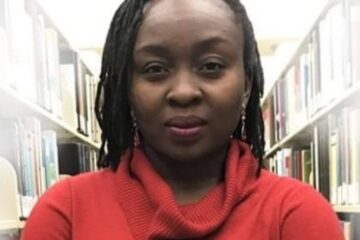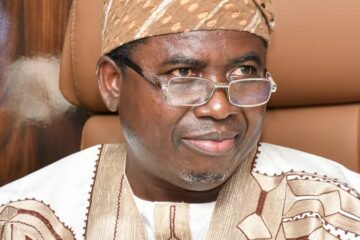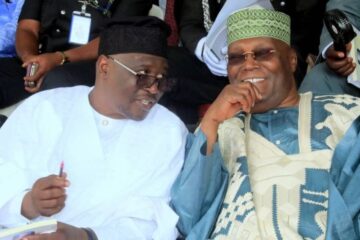
By Simon Kolawole
May I, at this point, humbly retract certain claims I made in my article, ‘Tinubu and Atiku: Birds of a Feather’ (THISDAY, June 12, 2022), months before the 2023 presidential election. In it, I claimed that Asiwaju Bola Ahmed Tinubu and Alhaji Atiku Abubakar “are friends, associates and two peas in a pod”. I traced their bond to the annulled third republic. I said they had been there for each other during political upheavals. As simple as it was, I didn’t remember that there are no permanent friends or foes in politics. Just permanent interests. All gloves are off now. Atiku is on an all-out war with Tinubu whom he wants disqualified and removed as president for alleged certificate forgery.
On Thursday, Atiku revealed that he had parted ways with Tinubu as far back as 2007. I hereby confess that I did not know this. In separate private conversations I had with both men before 2007, they came across as David and Jonathan. What we have today is nothing but Cain and Abel, although I’m not sure who is the Cain and who is the Abel. As Atiku has now told us, they cut political ties when he refused to make Tinubu his presidential running mate in 2007 because of the Muslim-Muslim ticket complications. I recall Tinubu opposing Atiku’s election petition against President Umaru Musa Yar’Adau in 2007 on the ground that all of them were from the same political family.
To be sure, this is not the first time Atiku is seeking a judicial decision on the basis of certificate in a presidential election. In 2019, he fought President Muhammadu Buhari all the way to the Supreme Court, maintaining that he did not have the requisite educational qualification to be president. Buhari had listed secondary school education on his INEC form but did not attach the West African School Certificate, which he claimed was with the military authorities. He eventually received a replacement from Cambridge, which used to conduct the WASC exams, and presented it to the tribunal. Atiku’s petition was dismissed. He also lost in the Supreme Court — but Buhari was hurt.
This time around, Atiku is seeking to prove that the Chicago State University (CSU) certificate presented to INEC by Tinubu is a forgery and, therefore, he was not qualified to run in the first place. Many people did not really give serious attention to this allegation in Atiku’s petition until he went to file for “discovery” at a US court on August 2, 2023, seeking an order to compel CSU to release Tinubu’s academic records. This was a day after the presidential election petition court (PEPC) had announced that it was adjourning to deliver judgment after all the petitioners, Atiku inclusive, and respondents had concluded their submissions. The US case, thus, basically went under the radar.
The PEPC actually prevented Atiku from arguing the forgery allegation on a technical ground. Atiku’s lawyers introduced the triple allegations of Tinubu’s conviction in the US, forgery of documents and dual citizenship long after they had filed the petition. The certificate was notably not on their list of proof of evidence. However, as the proceedings went, they introduced the issues. Tinubu’s lawyers said the time for filing new facts was over. Atiku’s lawyers said they were only providing further details. The PEPC, in its judgment, held that the electoral law provides that all evidence must be frontloaded and since this was not contained in the petition itself, Atiku had missed the timeframe.
In truth, Atiku did not have what he could present as evidence as at the time the PEPC sat and gave judgment. Maybe the lack of evidence contributed to the little attention paid to Atiku’s moves in the US. With the PEPC judgment going against Atiku on September 6, he decided to head to the Supreme Court — this time hoping that he could file a new evidence on the authenticity of Tinubu’s CSU certificate, known as “diploma” in the US. Still, many did not give much attention to this case until September 19 when the US court ordered CSU to release the academic records in time for Atiku’s appeal at the Supreme Court. It was at this stage that the internet caught fire as interest ballooned.
What did Atiku want to prove by demanding all these records? From all that I have read so far, I would summarise his intentions as follows: (1) to prove that the certificate Tinubu presented to INEC was forged (2) to argue that this is not the real Bola Tinubu (3) to create a moral crisis for Tinubu home and abroad. When Tinubu’s lawyers protested against the release of his records claiming it could hurt their client, even his own supporters began to panic. Many of them asked: “What is Tinubu trying to hide?” My first reaction was that his lawyers were trying to be dramatic. I had always believed Tinubu attended and graduated from CSU but that the devil is in the details.
Tinubu’s records were finally released. The CSU registrar, Caleb Westberg, made a deposition as a witness and representative of the university. He had previously sworn to an affidavit as well. If you lie under deposition, it is called “perjury” and you will have no option than to go to jail. So, it is not a joke. We all looked forward to the deposition as the final stage of the US leg in the post-election litigation. Atiku’s lawyers questioned Westberg extensively on the affidavit and the records. Westberg said so many things that, at a stage, my head was steaming from information overload. At the end of the deposition, the camps of Atiku and Tinubu both claimed to have won. It got more interesting.
I will try to summarise the testimonies as I understand them. Westberg swore to an affidavit that Tinubu graduated and was awarded a degree with honours from CSU on June 22, 1979. He said CSU awarded him a diploma and subsequently provided a certified (that is, official) copy of that diploma. He said both are “valid and authentic” diplomas from the university. He said there are differences in font, seal and signatories on the diplomas because many things had changed over the decades from 1979, when Tinubu graduated, to the 1990s, when he got a replacement. He said the discrepancies in the dates on the documents were possibly human since they were entered manually.
In the affidavit that accompanied the academic records, Westberg said the format of Tinubu’s replacement diploma dated June 27, 1997 matches the format of diplomas produced in the 1990s and 2000s. From the deposition, it appears there are two different CSU diplomas. There is the CSU diploma issued in 1979 when Tinubu graduated and there is the replacement dated 1997. Meanwhile, a diploma was released to Mike Enahoro-Ebah, an Atiku supporter, based on a court order. It is either Enahoro-Ebah was given the original 1979 version (which Tinubu presumably did not pick up then) or Enahoro-Ebah was given a replacement Tinubu ordered and didn’t pick up.
The one presented to INEC by Tinubu was dated 1997. The date was declared an error by the university. Michael Hayes, who also testified for CSU, took personal responsibility for the error and said he meant to type 1979, not 1997. I recall that in my journalism school days when typewriters were a thing, we called this “error of transposition” — when you mistakenly hit the second key before the first, meaning “9” would come before “7” in 79. It appears that the certificate Tinubu presented to INEC was another version entirely — produced in the 1990s or 2000s. Westberg, in his deposition, said he did not see what was presented to INEC and could, therefore, not comment on it.
So, why did the university certify the documents? He said the university does not usually certify documents but this was at the insistence of Tinubu’s lawyer. “It seems to be a Nigerian thing,” he said. (By the time this got into social media, the registrar was reported to have said: “Forgery is a Nigerian thing.”) Westberg also addressed why they had copies of diplomas for 1979 but didn’t have one for Tinubu. He said some students don’t pick up their diplomas — tying it back to the fact that it is the transcripts, not the diplomas, that really matter in the US. It is copies of unclaimed diplomas that he released to Atiku’s lawyers with the names of the students redacted for privacy reasons.
What else? Westberg said Tinubu attended Southwest College (now known as Richard Daley College), a feeder school for CSU. He said the Tinubu that attended Southwest College and transferred to CSU had the same social security number (like the NIN in Nigeria), and that it is the same person that is now president of Nigeria. On why the gender of the student that attended Southwest was written as “F” (female), he said it was possibly a clerical error as he himself did not know whether Bola Tinubu is the name of a male or female. But he pointed out that Tinubu filled “male” in his application form and was addressed as “Mr” in the letter offering him admission.
Overall, I think Atiku’s team conclusively proved at the deposition that the diploma presented to INEC by Tinubu was not the one issued in 1979 — as Enahoro-Ebah had obviously collected it or whatever version was in the file. And I think this is why Atiku’s supporters believe they won the tug-of-war. On the other hand, what Tinubu presented to INEC was not the 1979 diploma but a replacement. Westberg did not answer questions on the “INEC diploma” on the ground that it is not in the school’s possession. But he said Tinubu indeed applied for a replacement and if a 1979 diploma was to be replaced, there would be changes in format, font, seal and signatories as seen in the “INEC diploma”.
All eyes are now on the Supreme Court. Atiku’s lawyers will hope to use the academic records and the deposition to make a compelling case against Tinubu. There are still obstacles. One, they have to convince the court that a new evidence can be filed at this stage. If the Supreme Court exercises discretion and decides to allow new evidence, that will be a major hurdle scaled. The next hurdle will be the evidential weight the court attaches to it and if it is convinced beyond reasonable doubt that Tinubu actually committed forgery. These are the matters to be pursued and argued by the lawyers before the court. I can’t wait for all this to be over so we can face the core business of governance.
Whatever the case may be, this is a fight to the finish. No retreat, no surrender. I am, however, astonished at how Atiku has overtaken Peter Obi, the LP candidate, in the election petition race. Obidients had clearly dominated the airwaves in claiming Obi won the election and that Tinubu stole his mandate. Atiku, who officially came second, was always playing catch-up. But with a single burst of pace in September, Atiku has — like a seasoned marathoner — surged to the front in the race to upstage Tinubu. All the Obidients that I know are now rooting for Atiku. The enemy of my enemy is my friend. Remember: there are no permanent friends or foes in politics. Just permanent interests.
Culled from TheCable











